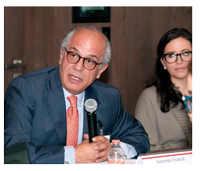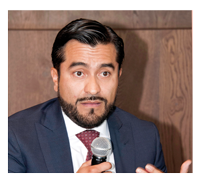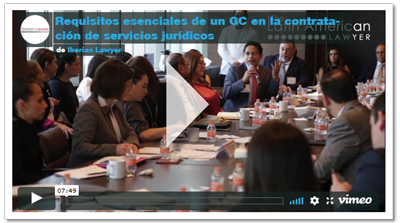“To become a true business partner you need to understand your partner’s business”

In-house and external counsel grapple with budget limitations and increased competition
Lawyers, both external and in-house, need to become more effective at communication to be efficient partners to the business, said participants at a recent event in Mexico City, organised by The Latin American Lawyer.
The event, hosted by Jones Day, brought together a group of external and internal lawyers from Mexico and Latin America. Attendees shared challenges and potential solutions in a changing environment, where technology and an increasingly sophisticated clientele are driving law firms, and even in-house lawyers, to be more effective.
At the top of the list of concerns of every in-house lawyer are their budget constraints, said participants. Elisabeth Eljuri, chief negotiator and chief legal counsel at energy company Sierra Oil & Gas and one of the panellists, noted that companies are more careful with their budgets, smartly planning their legal expenditure. As in house counsel, you need to choose whether to spend your budget in growing your team with specialists on certain matters, or if you hire an external law firm to do the work as needed, she said. Companies need to set up internal strategies to make that decision, particularly when time is of the essence. Selecting external counsel through a competitive bidding process also helps general counsel plan their spending strategies, she added.  Participants also discussed hiring strategies: some organisations choose to have a panel of law firms to handle their legal needs during a given amount of time, while others prefer to tender their work out every time they need external counsel. Attendees feel that the latter approach makes them lose the corporate history and the valuable relationship with their law firms.
Participants also discussed hiring strategies: some organisations choose to have a panel of law firms to handle their legal needs during a given amount of time, while others prefer to tender their work out every time they need external counsel. Attendees feel that the latter approach makes them lose the corporate history and the valuable relationship with their law firms.
True partners required
For Luis Alberto Cárdenas Díaz, legal director at Sabadell, beyond juggling the budgets and having external law firms aligned with those needs, in-house lawyers are required to become a true partner for the business. “However, to become a business partner you need to really understand the business, and get involved from day one in decisions and operations, demonstrating your value as counsel and not simply limiting your role to being the `no´ department.” External lawyers also need to get used to this new integral role by in-house counsel, he said. 
Antonio Franck, a partner at Jones Day who was also on the panel, welcomed the change in the role of the inside counsel. He highlighted that the fact that in-house lawyers are becoming more sophisticated is pushing law firms to follow suit. External lawyers need to truly understand the industry, business and market where their clients operate. “You need to discover the challenges for your clients and bring them the business solution.”
In addition, in-house lawyers also need to be versatile, said attendees, handling growing tasks with diminishing teams and budgets, as well as getting involved with the business executives. According to Juan Carlos Cruz, general counsel for Mexico and Latin America at BIC, in-house lawyers need to keep in mind that their primary clients, the business executives, are not lawyers. “Some external lawyers come at you with 200 pages of legal precedent; you cannot simply pass that on to the decision makers at your company.” He also added that in-house counsel needs to communicate effectively with the business to be able to move forward successfully.


















